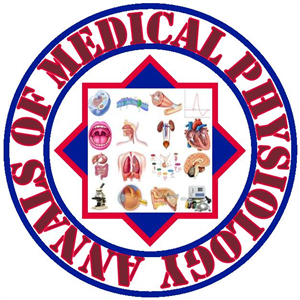A comparative study on ABO blood group and fertility hormones in infertile women in Calabar, Southern Nigeria
DOI:
https://doi.org/10.23921/amp.2018v2i2.298656Keywords:
ABO blood grouping, Estradiol, Follicle stimulationg hormone, Infertility, Leutinizing hormone, Progesterone, ProlactinAbstract
Infertility, a disorder of the reproductive system, is commonly linked to hormonal, pituitary, cervical, uterine, immunological or psychological factors. Besides these factors, it can also be idiopathic or unexplained. Hence, there is a need for more research to unravel the causes of the unexplained infertility. This work aimed at finding out whether there is any relationship between ABO blood group system and female infertility. The study design was cross-sectional. Three hundred women between 18 and 40 years attending fertility clinic at the University of Calabar Teaching Hospital, Calabar between 2011 and 2012 were recruited for this study. Serum progesterone, prolactin, follicle stimulating hormone (FSH), luteinizing hormone (LH) and estradiol were determined using Enzyme linked immunosorbent assay (ELISA) while ABO blood grouping was determined using the tube method. Statistical analysis was done using SPSS version 18. The confidence level was set at 95% where p-value less than 0.05 was considered statistically significant. The mean age of the women was 30.65 ± 5.47 years and the percentage distributions of the blood groups among the women were as follows: 24% A, 12% B, 4% AB and 60% O. The mean FSH levels of blood groups A and O individuals were significantly higher (p<0.05) than that of groups B. However, there was no significant difference (p>0.05) in the mean levels of progesterone, prolactin, LH and estradiol in the respective groups. From this study, 38% of the population had increased levels of progesterone, 58% and 18.7% had elevated prolactin and FSH levels respectively while 11.33% and 43.3% had reduced levels of LH and estradiol levels respectively. Though, there was high prevalence of hyperprolactinemia observed in this study, there was no strong association between ABO blood group and female infertility but, the increased FSH levels observed in blood groups A and O may be a potential link between blood group and infertility and therefore may be beneficial for further study.
Downloads
Metrics
References
Mires G, Khan KS, Gupta JK. Core clinical cases in Obstetrics and Gynaecology: A problem-solving approach. 3rd ed. Boca Raton, Florida: CRC Press; 2011.
Blunt S, Walker D. Infertility and pregnancy loss. In: David ML, editor. Common conditions in Gynaecology: A problem solving approach. London: Chapman and Hall medicals; 1997.
Rutstein SO, Shah IH. Infecundity, Infertility and childlessness in developing countries. Demographic and Health Surveys (DHS) Comparative reports No. 9. Calverton, Maryland, USA: ORC Macro and the World Health Organization (WHO); September 2004. Available from http://www.who.int/reproductivehealth/topics/infertility/DHS-CR9.pdf
Schmidt L, Christensen U, Holstein BE. The social and epidemiology of coping with infertility. Hum Reprod. 2005 Apr; 20(4):1044-52.
Okonofua FE, Snow RC, Alemnji GA, Okoruwa A, Ijaware CO. Serological and clinical correlates of gonorrhoea and syphilis in fertile and infertile Nigerian women. Genitourin Med. 1997 Jun; 73(3):194-7.
Wiersema NJ, Drukker AJ, Mai BT, Giang HN, Nguyen TN, Lambalk CB. Consequences of infertility in developing countries: results of a questionnaire and interview survey in the South of Vietnam. J Transl Med. 2006 Dec 27; 4:54.
Cousineau TM, Domar AD. Psychological impact of infertility. Best Pract Res Clin Obstet Gynaecol. 2007 Apr; 21(2):293-308.
Gronowski AM. Reproductive disorder. In: Burtis CA, Ashwood ED, Bruns DE, eds. Tietz Fundamentals of Clinical Chemistry. Ch 42, 6th ed. Philadelphia: Elsevier, Imprint Saunders; 2007.
Altmae S, Starvreus-Elvers A, Ruiz JR, Laanpere M, Syvanen T, Yngve A, Salumets A, Nilsson TK. Variations in folate pathway genes associated with unexplained female infertility. Fertil Steril. 2010 Jun; 94(1):130-7.
Cui W, Roggeveen G. Maasai couples seek safer solution to infertility. Bull World Health Organ. 2010 Dec 1; 88(12):885-6.
Nejat EJ, Jindal S, Berger D, Buyuk E, Lalioti M, Pal L. Implication of blood type for ovarian reserve. Hum Reprod. 2011 Sep; 26(9):2513-7.
Timberlake KS, Foley KL, Hurst BS, Matthews ML, Usadi RS, Marshburn PB. Association of blood type and patient characteristics with ovarian reserve. Fertil Steril. 2013 Dec; 100(6):1735-9.
Yilmaz N, Hancerliogullari N, Coskun B, Inal HA, Fenkci V. Is there any relationship between ABO and Rh blood group type on ovarian reserve and assisted reproductive technique outcomes in Turkish women? Poster presented at the 21st Controversies in Obstetrics, Gynecology and Infertility (COGI) Congress; Guilin, China, 2015 May 7-10.
Kish L. Survey sampling. New York: John Wiley & Sons Inc; 1965.
Hanna CW, Bretherick KL, Liu CC, Stephenson MD, Robinson WP. Genetic variation within the hypothalamus-pituitary-ovarian axis in women with recurrent miscarriage. Hum Reprod. 2010 Oct 1; 25(10): 2664-71.
Korhonen MO, Symons JP, Hyde BM, Rowan JP, Wilborn WH. Histologic classification and pathologic findings for endometrial biopsy specimens obtained from 2964 perimenopausal and postmenopausal women undergoing screening for continuous hormones as replacement therapy (CHART 2 study). Am J Obstet Gynecol. 1997 Feb; 176(2):377-80.
Liu Y, Gold EB, Lasley BL, Johnson WO. Factors affecting menstrual cycle characteristics. Am J Epidemiol. 2004 Jul 15; 160(2): 131-40.
Fehring RJ, Schneider M, Raviele K. Variability in the phases of the menstrual cycle. J Obstet Gynecol Neonatal Nurs. 2006 May-Jun; 35(3):376-84.
Shapiro M, Bressler L. Blood type correlates with egg reserve in infertile women, October 18, 2014. Available from www.2minutemedicine.com/blood-type-correlates-with-egg-reserve-in-infertile-women/ (Last accessed April 15, 2016)

Published
How to Cite
License
Copyright (c) 2018 Quench Academy of Medical Education and Research (QAMER)

This work is licensed under a Creative Commons Attribution 4.0 International License.
The authors warrants and represents that the submitted MANUSCRIPT is an original work and has not been published before in any form, and that it does not infringe upon any copyright or other right(s), that it does not contain infringing, libelous, obscene or other unlawful matter, that he/she is the sole and exclusive owner of the rights here-in conveyed to the Publisher, and that he/she has obtained the customary permission from the copyright owner or his legal representative whenever a text/passage from copyrighted material is quoted or a table or illustration from such material is used. The Author(s) will indemnify the Publisher for, and hold the Publisher harmless from any loss, expense or damage occasioned by any claim or suit by a third party for copyright infringement or arising out of any breach of the foregoing warranties as a result of publication of the Article. The Article shall be delivered to the Publisher free of copyright charges. In the event that the Article is not accepted and published by Publisher, this agreement becomes null and void.
Sherpa/Romeo publisher policy can be viewed at Annals of Medical Physiology - Sherpa/Romeo Policy
Plum X metrics
Article level metrics are shown here









